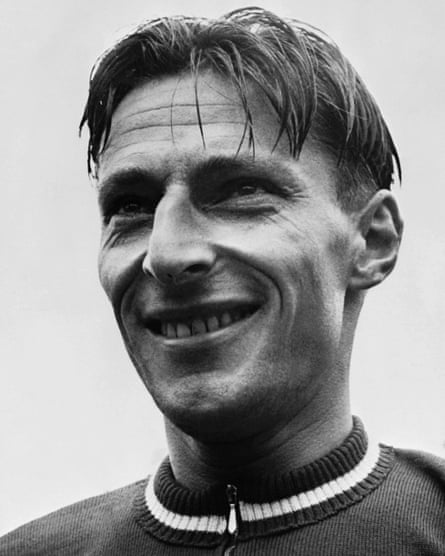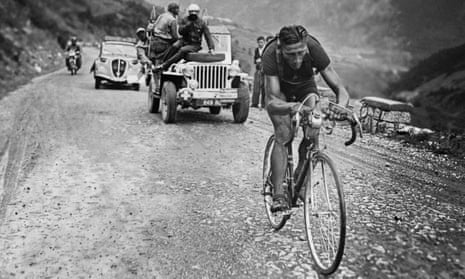The Swiss cyclist Ferdi Kübler, who has died aged 97, was the oldest living victor of the Tour de France, which he won in 1950, and the last survivor of a group of champions who dominated cycling’s golden age immediately after the second world war, men such as Fausto Coppi, Gino Bartali, Louison Bobet, Rik Van Steenbergen and Hugo Koblet. It was estimated that Kübler had pedalled 700,000km by the end of his 19-year career.
Variously nicknamed “the horse”, for his relatively tall stature, “the pedalling madman” – because of his habit of talking to himself as he rode along – or “the cowboy”, due to his penchant for stetson hats, Kübler’s best years were 1950 and 1951, when he took the world title and the “Ardennes weekend” of the Flèche Wallonne and Liège-Bastogne-Liège Classics, then run on a Saturday and Sunday. He repeated this double in 1952.
In 1954 Kübler was still good enough to finish second in the Tour, and he returned in 1955 to suffer a defeat that is the stuff of legend. That year’s stage over Mont Ventoux took place in burning heat, but Kübler attacked early on the mountain. He was warned by the Frenchman Raphaël Géminiani that “the Ventoux is not a mountain like the others” but replied, “and Ferdi is not a cyclist like the others”.
In an episode that foreshadowed the death of the Briton Tom Simpson 12 years later, Kübler suffered heatstroke, zig-zagged across the road, and was close to collapse near the top of the mountain, climbing off his bike that evening muttering: “Ferdi is too old. Ferdi is hurting. Ferdi killed himself. The Ventoux did for him.” Unspecified doping products were found that evening in his hotel room, most probably amphetamines, which were in common circulation at the time. Kübler quit the race, never returned to the Tour and retired two years later.

Born in Marthalen, in the countryside near Zurich, Ferdi was one of five children of Alfred and his wife, Lina (nee Ehrensperger). They were an impoverished farming family and Ferdi ran away from home to find a job as a baker’s delivery boy, riding more than 50 miles a day before becoming a professional cyclist in 1940 – against the advice of his father – in order to support the family. During the years of the second world war he raced only in neutral Switzerland, but after the end of hostilities he became the first rider to wear the yellow jersey when the Tour de France resumed in 1947.
In the 1949 Tour de France, with the campionissimo Coppi at the height of his powers, Kübler was unfortunate enough to get three punctures when in the lead on a crucial stage through the Alps. He ran out of spare tyres, by unhappy coincidence his service car had broken down, and he stood by the roadside watching his rivals pass one by one. The day produced the most enduring image of Kübler, waving his bike pump in a fit of anger, cursing his luck with tears in his eyes.
The following year, Kübler was spurred on by the emergence of a Swiss rival, Koblet – “blond, gentle and harmonious” compared to the “dark, violent and chaotic” Kübler, according to one writer – and triumphed in a three-way battle with Bobet and the Belgian Stan Ockers, in a race marked by the withdrawal of a strong Italian team including Bartali after a roadside crowd turned hostile in the Pyrenees.
His aim in winning the Tour was never to work again. After a long period when he was involved in sponsorship at the Tour of Switzerland, he took up skiing. He mey Christina Leibundgut, an air stewardess, in Davos, and they married in 1976. He devoted most of his final years to playing golf.
He is survived by Christina and his two sons, Andre and Stefan, and a daughter, Anita, from a previous marriage to Rosli Ellenberger, which ended in divorce.

Comments (…)
Sign in or create your Guardian account to join the discussion